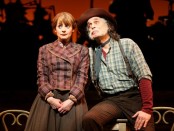Peter Kaczorowski
Peter Kaczorowski (born 1956) in Buffalo, New York is a theatrical lighting designer. He is credited with lighting designs for Broadway and off-Broadway shows, as well extensive work in opera. He has been nominated five times for Tony Awards and won the Tony Award for Best Lighting Design for The Producers and the Drama Desk Award for Outstanding Lighting Design for Contact. He is also the recipient of Outer Critics, Drama-Logue and Hewes design awards. He was recently nominated (in 2012) for the Tony Award for Best Lighting Design of a Play for The Road to Mecca.
http://en.wikipedia.org/wiki/Peter_Kaczorowski
The writers seem afraid to state what the story is all about, the word gay being mentioned exactly once. At two hours and 15 minutes including one intermission, today’s audience is way ahead of the plot, knowing exactly what will happen in advance. While the 1994 movie was 23 minutes, the musical seems padded and dragged out. Davis’ music is pleasant enough, but Collins’ lyrics are pedestrian and repetitious. The songs seem to have a limited vocabulary such as children’s books often do, but 13 year olds have a slang and vernacular that is hardly used. The biggest problem with the score is that the dream Diana Ross (played flamboyantly and spiritedly by Yasmeen Sulieman) gets to sing seven of her most iconic songs (“Do You Know?,” "It’s My Turn,” “Upside Down,” “Ain’t No Mountain High Enough,” “Remember Me,” “Endless Love” and “I’m Coming Out”) which are far superior to any of the new songs, always a mistake in a non-jukebox musical. [more]
The Unsinkable Molly Brown
Although director/choreographer Kathleen Marshall has given the Transport Group production staged at The Abroms Arts Center a rousing production, the major problem still exists with the story: Molly goes from tomboy to wife to social activist but always seems to be the same. Basically Malone changes her outfits (costumes by Sky Switser) and becomes more mature and more sophisticated but never really changes from the girl at heart who wants riches and gaudy things. Costar David Aron Damane, with his powerful baritone, who plays J.J. Brown, the miner who strikes it rich and proceeds to give Molly almost everything she wants, helps a good deal but their love story is not made entirely believable, possibly because the stalwart Damane is still made to be a very retiring hero, a man of few words. [more]
Much Ado About Nothing (Free Shakespeare in the Park)
Director Kenny Leon has made his reputation with trenchant productions of contemporary and new plays by such authors as Lorraine Hansberry, August Wilson, Katori Hall and Lydia R. Diamond. Now with his delightful all-black modern dress version of "Much Ado About Nothing" at the Delacorte Theater for Free Shakespeare in the Park he demonstrates a light touch with classic plays. Led by Danielle Brooks, star of "Orange is the New Black" and Tony nominated for her performance as Sofia in the 2015 revival of "The Color Purple," the generally youthful cast is up to the requirements of this witty Shakespeare comedy. [more]
Sea Wall/A Life
Both plays deal with young husbands who are coping with new fatherhood as well as their new responsibilities and their relationships with the dominant male figures in their lives. In Stephens’ "Sea Wall," Sturridge speaks admiringly of his father-in-law, while in Payne’s "A Life," Gyllenhaal speaks with love of his own father. Both men are madly in love with their wives who they could not consider living without. These plays are ultimately tragedies of the accidental kind, events that one has no control over and cannot see coming. The double bill is performed on a basically empty stage with a brick wall behind (designed by Laura Jellinek), on which Peter Kaczorowski’s poetic and atmospheric lighting is a kind of additional onstage character. Carrie Cracknell's assured direction pilots both plays. [more]
Fiddler on the Roof in Yiddish
The property is now more than a half-century old. But this production makes it seem as though the 1964 iteration were merely an English-language version of a classic from even longer ago. There’s a greater feeling of immediacy than perhaps ever before. Hearing the characters speak and sing in the tongue that their real-life 1905 contemporaries would have used is deeply moving. What a shame that so many speakers of Yiddish from decades past never got the chance to experience the musical in this guise. [more]
Choir Boy
Now playing at the MTC’s Samuel J. Friedman Theatre on Broadway, "Choir Boy" is set at The Charles R Drew Preparatory School for Boys, a Catholic academy for young men of color. Written by Tarell Alvin McCraney (who shared the 2017 Academy Award for Best Adapted Screenplay for Moonlight), the problem with the play is that Pharus’ colleagues and choir mates prove as generic as the student uniforms they all wear: blue blazers, white shirts, striped ties, and beige trousers. (The costume designer is David Zinn, who also did the scenery.) [more]
American Son
“That’s it?” is likely to be one’s reaction at the conclusion of playwright Christopher Demos-Brown’s tidy topical 90-minute racial drama "American Son." Theater enthusiasts often rhapsodize about Broadway’s Golden Age, the 1920’s to the 1960’s, when straight plays filled theaters. Mr. Demos-Brown’s effort does harken back to that era by crafting a well-constructed minor vehicle for actors of the sort that could have played a season, then toured, was made into movie and was forgotten. Kerry Washington and the fine cast make the most of their choice roles under Kenny Leon’s solid direction. [more]
The Parisian Woman
Inspired by Henri Becque’s notorious 1885 "La Parisienne," credited as the first Naturalistic French play, Willimon has taken its plot, characters and themes of sex, adultery, betrayal and power. To this he has added modern politics as it is being practiced in Trump’s Washington. Tom, a high-powered Beltway tax lawyer who works with both Democrats and Republicans, and Chloe, his socialite wife, are in an open marriage. While she is attempting to break up with her lover Peter, a banker, Tom asks for his help in getting the nomination for an appointment on the circuit court though he has never been a judge before. When it looks like Tom is no longer in the running, Chloe decides to act on her own and approaches her new friend Jeanette, the President’s choice for Chair of the Federal Reserve, a staunch Republican power broker and contributor. How this plays out shows the ins and outs of Washington negotiating. While none of this is particularly new, Willimon uses some of the latest contemporary wrinkles. [more]
Gently Down the Stream
In between the scenes between the two men in Beau’s living room, Rufus records Beau’s reminiscences of his life and times. In this way, Sherman gives us a review of what things were like for gay men from 1940 up to the present, from the stories Beau had been told about the war years to his own personal and painful experiences from 1960 on. Beau’s memories include gay life in New Orleans, New York, San Francisco, Paris and London and cover police brutality and the rise of AIDS. Besides being flattered to be asked to tell his story, Beau also want to pass on his experiences to the next generation who have had its easier. While the play becomes schematic alternating scenes between the two, Fierstein is so convincing in these authentic but surprising tales of the past that it never becomes simply a device. [more]
Aubergine
Playwright Julia Cho has crafted an engaging and universal work that unevenly blends reality with mysticism. The characters are all very well delineated and the dialogue is flavorful and realistic. It’s structured as a series of short scenes that include monologues, flashbacks and fantasies. The play’s two-act form diminishes its momentum, running two hours and fifteen minutes with an intermission. Repetitiveness and a preoccupation with profundity sidetrack its effectiveness at times. [more]
Buried Child
After a twenty year hiatus from the New York theater scene, Sam Shepard’s Pulitzer Prize-winning "Buried Child" is back in the Big Apple but in a more intimate setting. This latest iteration of the dramatic classic sees its return to the world of Off-Broadway, with a limited engagement at The Pershing Square Signature Center. Loaded with a powerhouse cast led by Ed Harris, the latest from the The New Group is a fresh take on an American classic. [more]
Our Mother’s Brief Affair
Linda Lavin wears Anna in Richard Greenberg’s "Our Mother’s Brief Affair" like a chic couture outfit with many layers each of which reveals layers of colorful, woven cloth. There is a constant glow about her as she relates, mostly in flashbacks, the story of an illicit, but exciting affair with a stranger she met many years ago while waiting for her son, Seth (a bemused, but effective Greg Keller) to emerge from his Juilliard viola lessons. [more]
Of Good Stock
Plays about three very different sisters go back to Shakespeare’s "King Lear." In modern times, the topic immediately recalls Chekhov’s "Three Sisters" and more recently Wendy Wasserstein’s "The Sisters Rosensweig" and Beth Henley’s Pulitzer Prize-winning, "Crimes of the Heart." Melissa Ross, whose excellent Nice Girl just completed its world premiere at the Labyrinth Theater Company, has entered the fray with "Of Good Stock" with a cast led by film star Alicia Silverstone returning to the New York stage. While the play is entertaining and believable under Lynne Meadow’s direction, it is also overly familiar without revealing any new depths. [more]
The Spoils
Can an obnoxious, sadomasochistic nerd be the central character of a play? This is the thought that will run through your mind as you watch Jesse Eisenberg’s third play, "The Spoils," being given its world premiere by The New Group. As it turns out if you knew Ben, the latest role Eisenberg has written for himself, you would probably run the other way. However, staged by The New Group’s artistic director Scott Elliott,"The Spoils" is absorbing theater and you sit riveted to see if Ben will get what he deserves. [more]
Paint Your Wagon
The concert series Encores! “celebrates the rarely heard works of America’s most important composers and lyricists.” With "Paint Your Wagon," they have selected a perfect candidate to demonstrate their mission. Until now, it hasn’t been revived in New York City, and though some of the songs have remained familiar, the show itself has faded into relative obscurity. Artistic Director Jack Viertel and playwright Marc Acito are credited with this concert adaptation of the original book. [more]
Sticks and Bones
With "Sticks and Bones"' theme of the displacement of the returning American army veteran once again topical due to the wars in Iraq and Afghanistan, the play would seem to be entirely relevant once again. Unfortunately, Scott Elliott's production which has a shifting tone throughout does not make a very convincing case for this Vietnam era family drama. Holly Hunter, Bill Pullman, Richard Chamberlain and company are fine actors left adrift by a flawed and confused production. [more]
The Band Wagon
Encores!, known for reviving neglected Broadway musicals for limited runs, is presenting the show. Here, it has strayed from its mission by producing this new adaption of a classic film musical, billed as "A Special Event," with mixed results. The first act drags with exposition and setting up complications that are sluggishly rendered. The second act is lively and very enjoyable. [more]
The Country House
"The Country House" is an old-fashioned drawing room comedy about theater and film people inspired by the plays of Anton Chekhov. From Donald Margulies whose track record includes "Time Stands Still," "Brooklyn Boy," "Sight Unseen," "Dinner with Friends" and "Collected Stories," we have come to expect something more emotionally satisfying. Blythe Danner, Daniel Sunjata, David Rasche and cast are good company but do not make a very convincing case for this new play [more]
The Substance of Fire
Time has caught up with Jon Robin Baitz’s 1991 play and bankrupting one’s company over issues of integrity no longer seems quite admirable. Jon Robin Baitz writes literate, thoughtful plays like his 2012 Pulitzer Prize finalist, Other Desert Cities. However, like the revival last fall of his earliest play The Film Society showed, plays may date badly or their attitudes become artifacts of another generation. [more]




















